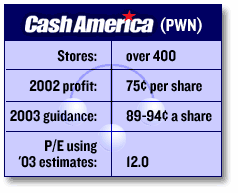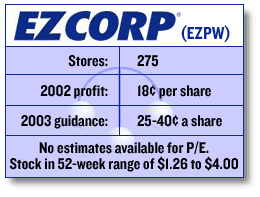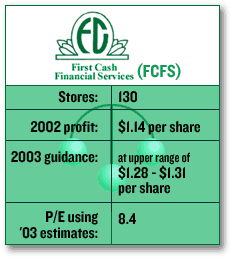NEW YORK (CNN/Money) -
The bear market has left more than a few investors with that cash-strapped feeling -- the kind that makes you want to hawk that gold watch or find an undervalued investment to recoup some losses.
In either case, pawn shops could fit the bill.
During the three-year bear market, the nation's publicly traded pawnbrokers have seen their stocks perform far better than the Standard & Poor's 500.
Cash America, the largest U.S. pawnbroker, is up 18 percent since the start of 2000, and No. 3 First Cash Financial Services has soared 42 percent. EZ Corp., the No. 2 chain, is off 2.8 percent while the S&P 500 is down about 36 percent in that period.
When the economy slows down, pawn shops thrive. As people lose their jobs or take lower-paying ones, many find a need for small, short-term loans.
 |
|
| As of May 7, 2003. |
"Pawn brokers cater to people with household incomes at the bottom 20 percent of the U.S. range," said Jeffery Dabbs, a chartered financial analyst with Kercheville & Co.
"When the economy slows down and costs go up, such as gas prices, these people are usually the first to feel the impact," Dabbs notes. Kercheville runs a hedge fund that owns Cash America shares.
Although the stocks of pawn brokers have seen a decent run through the bear market, the sector receives little attention from Wall Street. Just three analysts cover Cash America and First Cash. EZ Corp. has no coverage.
Wall Street analysts that do cover the sector are bullish.
"I've had to raise my profit estimates for the (two) companies because they've kept raising guidance and performing well. Their fundamentals remain strong and that's why I've kept a 'buy' rating on them," said RTX Securities analyst Traci Mangini. She does not own shares of Cash America or First Cash, nor does her firm have a banking relationship with the companies.
Indeed, Stephens Inc. analyst Dennis Telzrow has raised his price target on Cash America (PWN: up $0.23 to $11.44, Research, Estimates) shares three times this year to $14.
The stocks have price-to-earnings ratios below traditional bankers, with Cash America sporting a P/E ratio of 12.0 using 2003 profit forecasts and First Cash (FCFS: up $0.15 to $11.41, Research, Estimates) a 8.4 ratio. The Dow Jones Banking index has a P/E ratio of 12.4, using 2003 profit estimates, according to research firm First Call.
No earnings estimates were readily available for EZ Corp. (EZPW: unchanged at $3.75, Research, Estimates), so a P/E could not be calculated. The stock has traded in a 52-week range of $1.26-to-$4.00.
The pawning client
Pawn shop patrons typically live paycheck to paycheck, use cash for purchases, and don't have bank accounts, according to industry analysts. So if they run into unexpected expenses, such as high medical or utility bills, offering personal property as collateral is often their only way to get a loan.
"While this demographic is the first to feel the impact of an economic slowdown, it's the last to benefit when the economy picks up," Kercheville's Dabbs noted. "There's generally a 12- to 18-month lag until this group sees a recovery."
When a customer does turn in an item at a pawn broker, he receives a loan, about $70 on average, that can be repaid in up to three months. Interest rates range from 30 percent to 300 percent annually, depending on the state.
During the term of the loan -- the average is about 50 days -- the customer can come back and reclaim the pawned item if the principal and interest are paid in full. If the customer doesn't come back, the pawn shop can resell the merchandise.
While using a pawn broker may smell of financial desperation, about 65-to-70 percent of customers return to pick up their goods, according to a spokesman for Cash America, who said rates across the industry are fairly standard.
 |
|
| As of May 7, 2003. |
"You'll typically see the same items over and over again," according to RTX's Mangini. "You may see the same person turn in a rifle at the end of every hunting season and come in to reclaim it when the next season starts."
The Cash America spokesman said the typical customer uses the pawn shop for a loan three-to-six times a year and the reappearance of borrowers points to the continuing need for loans, even with the economy growing, albeit slowly.
Remaking an image
The image of pawn shops has long been that of dark, dingy places that engage in loan sharking and predatory lending to unscrupulous characters. But Cash America, First Cash, and EZ Corp. are looking to change that appearance.
"These places are clean, have nice glass display cases, and look like your typical retail store," said Dabbs. "They want people to be comfortable going in there."
Individual states regulate pawn shops and the interest rates they charge. The average monthly interest rate averages about 25 percent, but can approach 300 percent on an annual basis in states such as Florida.
While the loan rate may seem exorbitant to some, it beats the alternative of bounced checks, said Stephens Inc.'s Telzrow.
"Let's say you take out a $100 loan from a pawn broker for two weeks with a cost of $18. A bounced check carries a charge of $25 from the bank and some retailers also charge a $25 fee for a cancelled check. So the high monthly rate on a pawn loan makes sense for some people," said Telzrow.
 |
|
| As of May 7, 2003. |
Still, the high loan rates are criticized by some consumer groups that want regulators to get tougher on the pawn brokers.
But that could actually be a boon for the three public chains, which only own 8 percent of the 10,000-to-12,000 shops in the United States. More regulation would probably mean lower loan rates, which could force smaller pawn shops out of business.
Mangini sees the chance of increased regulation as minimal. "We believe that regulators recognize the need for pawnshops and don't want to impose regulations that force them out of business," she wrote in a recent report.

|

